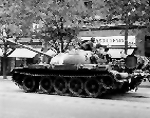Course home
page
Assignment
What were the specific elements of the Prague
Spring that the Soviet Union found dangerous?
Background
In the early months of 1968, a progressive faction
of the Czechoslovak Communist Party set about liberalizing Czechoslovak life,
democratizing the government and loosening the country's association with
the USSR. This movement became known as the Prague
Spring.
It began in January 1968 when Alexander Dubchek
replaced Antonin Novotny as head of the communist party. Dubchek soon
initiated a series of reforms that centered on increased expression, public
debate and intellectual freedom (with less press censorship). Dubchek
called this "Socialism with a Human Face." Czech leaders tried to reassure
Soviet leaders that they had no intention of removing Czechoslovakia from
the Warsaw Pact. (Allegedly, the mistake made by Hungary in
1956.)
The reform program won mass support in
Czechoslovakia, but the USSR and its Warsaw Pact allies felt it dangerous
and decided to end the Czechoslovak experiment. On 20 August, Warsaw Pact
forces (Soviet, East German, Polish, Hungarian and Bulgarian troops) occupied
the country. Czechoslovakia again became a tightly controlled, orthodox
Communist state, although clandestine resistance began to developed during
the 1970s. Dubchek was replaced as head of the communist party by Gustav
Husak in 1969.
Timeline
-
5 January 1968 Stalinist party
chief Antonin Novotny voted out of the communist party's central committee,
and Alexander Dubchek (1921-), a slovak with a liberal reputation, replaced
him as First Secretary of the communist party.
-
April 1968, Novotny removed as
president, and General Jan Svoboda installed.
-
Prague Spring, "Socialism with
a Human Face," as Dubchek ended censorship and instituted liberal economic
reforms. Dubchek continued to proclaim loyalty to Moscow to avert a
replay of 1956 in Hungary, but increasingly Soviet leaders became
suspicious.
-
29 July 1968, Czech and Soviet
leaders met at Cierna near the border to "discuss" the
situation.
-
June 1968, Warsaw pact maneuvers
held in Czechoslovakia.
-
20/21 August 1968, Warsaw Pact
invasion. The Czech army did not resist; although there were a few
isolated outbreaks of fighting.
-
Brezhnev Doctrine (Pravda,
25 September 1968), justified the intervention.
-
28 October 1968, large protests
occurred in Prague against the Soviet occupation.
-
17 April 1969, Gustav Husak replaced
Dubchek as first secretary of the communist party.
WWW sites
For the principles involved in Czechoslovakia
in 1968, see:
Leonid
Brezhnev (1906-1982).
Alexander
Dubcek (1921-),
Vaclav
Havel (1936-),
Gustav
Husak (1913-) and
Ludvig Svoboda
(1895-)
A general, interesting site about Prague's colorful
background is the
Prague history
page (or archiv.radio.cz/history/history02.html). Radio Prague's home page has a general description of the
Prague Spring, and there are
some photos
of the Warsaw Pact intervention on the
web. See also, The Guardian's photos.
Two articles are from Cold War International
History Project, both by Mark Kramer:
New
Sources on the 1968 Soviet Invasion of Czechoslovakia (*.pdf) and
The
Prague Spring and the Soviet Invasion of Czechoslovakia: New
Interpretations. (*.pdf)
Two important documents are the
Czech
"Request" for Soviet Intervention (on page 35 of the *.pdf) in August 1968 and
the Brezhnev
Doctrine (Pravda, 25 September 1968), justifying the
intervention.
Hale Boggs,
Disclosed
news of the Russian invasion of Czechoslovakia.
Also
Recommended Books
There are two good studies of recent Czech
history: J. Korbel, Twentieth Century Czechoslovakia: The Meanings
of its History (1977); H. G. Skilling, Czechoslovakia's Interrupted
Revolution (1976).
Published documents and sources include:
Ruth Tosek and Mark Kramer, eds., Prague Spring, 1968: A National
Security Archive Documents Reader (1993); Dubcek's Blueprint for
Freedom: His Original Documents Leading to the Invasion of Czechoslovakia
(Commentary by Paul Ello, 1969); and Alexander Dubchek's Hope Dies
Last: The Autobiography of Alexander Dubcek (1993), Dubcek
Speaks (1990) and Komunisti a národné dedicstvo:
vybrané prejavy k otázkam slovenskej národnej
histórie (1968).
For analyses of the Prague Spring, see:
Kieran Williams, The Prague Spring and Its Aftermath: Czechoslovak
Politics, 1968-1970 (1997); Jan Pauer, Prag 1968: der Einmarsch
des Warschauer Paktes Hintergründe-Planung-Durchführung (1995);
Rüdiger Wenzke, Die NVA und der Prager Frühling 1968:
die Rolle Ulbrichts und der DDR-Streitkräfte bei der Niederschlagung
der tschechoslowakischen Reformbewegung (1995); Eleonora Schneider,
Prager Frühling und samtene Revolution: soziale Bewegungen
in Gesellschaften sowjetischen Typs am Beispiel der Tschechoslowakei
(1994); Václav Kural, et al, Ceskoslovensko roku 1968 (1993);
Jiri Valenta, Soviet Intervention in Czechoslovakia, 1968: Anatomy
of a Decision (with a new foreword by Alexander Dubcek, 1991); Ivan
Sviták, The Unbearable Burden of History: The Sovietization
of Czechoslovakia (1990); Carlo Ricchini e Luisa Melograni, Primavera
indimenticata: Alexander Dubcek ieri e oggi (1988); Karen
Dawisha, The Kremlin and the Prague Spring (1984); Vladimir Kusin,
The Intellectual Origins of the Prague Spring: The Development of
Reformist Ideas in Czechoslovakia, 1956-1967 (1971); Victor Fic, The
Prague Spring, 1968: A Study in Social Change (1970).
Related Events
1948 Communist Takeover in Czechoslovakia
1989 Velvet Revolution
Cold War
Leonid Brezhnev
|

